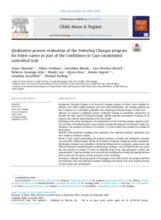Abstract
Background
Fostering Changes is an in-service training program for foster carers designed to enhance carer skills, coping strategies and carer-child relationships. The training program has been evaluated in a randomised controlled trial comparing Fostering Changes to usual care.
Objective
To conduct a qualitative process evaluation drawing on stakeholder perspectives to describe the logic model of Fostering Changes, identify potential mechanisms of impact of the program and enhance understanding of the trial results.
Participants and setting
Participants were stakeholders in the Fostering Changes program delivered in Wales, UK including foster carers invited to attend the program (18 attendees, eight non-attendees), two program developers, five trainers, 12 social workers who attended or recruited to the program.
Methods
Total population sampling with qualitative data collection methods. Qualitative data were subject to thematic analysis.
Results
A logic model summarising the program resources, activities and anticipated outcomes was generated. Implementation themes were quality of training, setting and group composition. Mechanisms of impact were identified with themes falling into two categories, group process and skills development. Potential barriers to effectiveness included a poor fit between the carer needs and the program in relation to levels of challenge being faced, age-appropriate content and responsiveness. Contextual factors were also relevant, including the existing relationship between foster carers and the agency and the perceived value of training.
Conclusions
Although the group aspects of the program were well received, the program itself did not help foster carers deal with more complex challenges and needed to be more targeted in terms of carers needs and circumstances.
View full article here.

